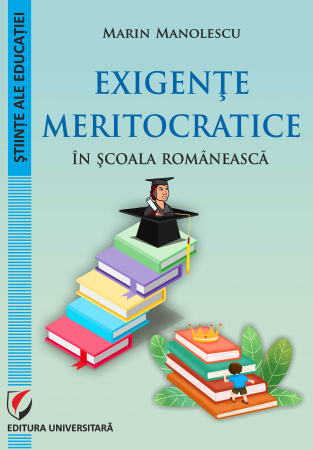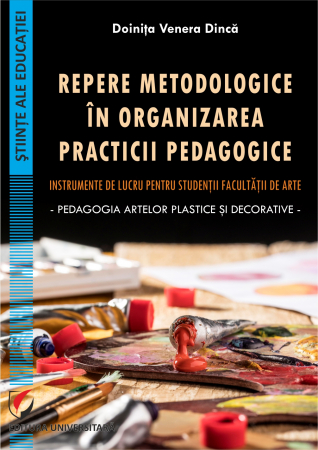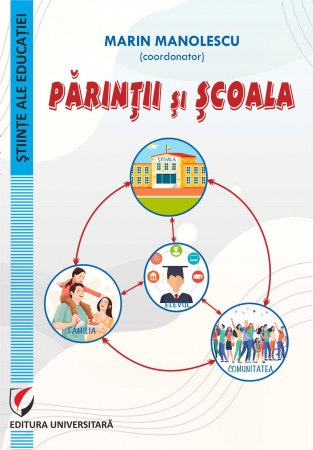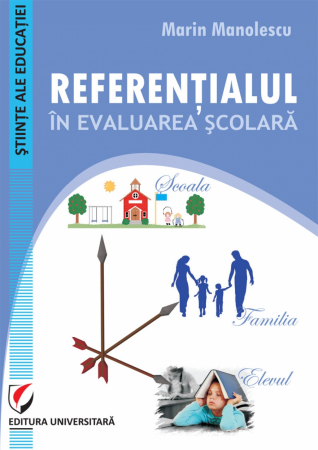Manuscript proposals: [email protected] / 0745 204 115 //// Tracking orders Individuals / Sales: 0745 200 357 / Orders Legal entities: 0721 722 783
Publisher: Editura Universitară
Author: Valentina Salomia
Edition: I
Pages: 150
Publisher year: 2024
ISBN: 978-606-28-1837-1
DOI: 10.5682/9786062818371
Product Code:
9786062818371
Do you need help?
0745 200 357
- Description
- Download (1)
- Authors
- Content
- More details
- Reviews (0)
he present work highlights the theoretical foundation of the scientific work with the title "Peculiarities of socialization in preschool children", supported in the 2016-2017 school year, with a view to awarding the didactic degree I. I approached this topic, because it represents a current problem in psychopedagogy. We all know that the purpose of education involves the formation and permanent development of the human personality, with the aim of optimal social integration of the individual, to the requirements of the community.
Socialization is a complex and extensive process, which involves stages, forms, mechanisms, factors of socialization. The basis of socialization is the family, the educational institution, the community. It is important for every parent to be a role model for their child. Also, the kindergarten, through all types and forms of instructional-educational activities, provides the child with individualization through socialization. The game, by its complexity, regardless of the place of its implementation, outdoors, at home, in kindergarten, gives the child security and self-confidence. Through play, the child discovers the world, loves, experiences emotions, dreams, evaluates his capabilities and limits, forms his self-image, the latter two being essential premises for socialization. And last but not least, socialization imprints in the child's soul and mind the true moral values that a modern society needs: love, kindness, honor, fairness, respect, responsibility, empathy, courage.
The educator's model is decisive, because she has the noble mission of stimulating relationships between children, making them want to be with others, cooperate and fulfill various social roles. I invite you to read this work, because the topic addressed is and will remain topical.
Salome Valentina
Socialization is a complex and extensive process, which involves stages, forms, mechanisms, factors of socialization. The basis of socialization is the family, the educational institution, the community. It is important for every parent to be a role model for their child. Also, the kindergarten, through all types and forms of instructional-educational activities, provides the child with individualization through socialization. The game, by its complexity, regardless of the place of its implementation, outdoors, at home, in kindergarten, gives the child security and self-confidence. Through play, the child discovers the world, loves, experiences emotions, dreams, evaluates his capabilities and limits, forms his self-image, the latter two being essential premises for socialization. And last but not least, socialization imprints in the child's soul and mind the true moral values that a modern society needs: love, kindness, honor, fairness, respect, responsibility, empathy, courage.
The educator's model is decisive, because she has the noble mission of stimulating relationships between children, making them want to be with others, cooperate and fulfill various social roles. I invite you to read this work, because the topic addressed is and will remain topical.
Salome Valentina
-
Peculiarities of socialization in preschool children
Download
VALENTINA SALOMIA
Preface / 7
Argument / 9
CHAPTER I
THE CONCEPT OF SOCIALIZATION / 13
1.1. Brief history of socialization and the socialization process / 13
1.2. Theories of socialization / 17
1.3. Stages of socialization / 25
1.4. Forms (types) of socialization / 27
1.5. Mechanisms of socialization / 31
1.5.1. Social learning; assumption and assimilation of roles / 31
1.5.2. Language learning, thought-language relationship, components of social learning / 36
1.5.3. Observing another's behavior by imitating and identifying with the other / 43
1.5.4. Didactic learning / 48
CHAPTER II
THE PRESCHOOLER, SUBJECT OF SOCIALIZATION / 53
2.1. Psychophysical and motor development of preschoolers (second childhood) / 53
2.2. Cognitive development in preschool (sensations, perceptions, representations) / 62
2.3. Development of socio-emotional skills in preschool / 74
2.4. Personality formation as a side of preschool socialization / 79
2.5. The formation of social behaviors in preschool / 82
CHAPTER III
SOCIALIZATION FACTORS IN PRESCHOOLERS / 92
3.1. The role of the family in the primary socialization of preschoolers / 92
3.2. Kindergarten, the second factor of socialization / 103
3.2.1. The successive adaptation of social statuses / 114
3.2.2 Adaptability of the preschooler to the kindergarten environment / 114
3.2.3. Practical educational communication in preschool socialization / 115
3.2.4. Valorization of the game in the exercise of social roles / 118
3.3. The family-kindergarten-community partnership, a condition for the preschooler's social integration / 128
Conclusions / 139
Bibliography / 143
Argument / 9
CHAPTER I
THE CONCEPT OF SOCIALIZATION / 13
1.1. Brief history of socialization and the socialization process / 13
1.2. Theories of socialization / 17
1.3. Stages of socialization / 25
1.4. Forms (types) of socialization / 27
1.5. Mechanisms of socialization / 31
1.5.1. Social learning; assumption and assimilation of roles / 31
1.5.2. Language learning, thought-language relationship, components of social learning / 36
1.5.3. Observing another's behavior by imitating and identifying with the other / 43
1.5.4. Didactic learning / 48
CHAPTER II
THE PRESCHOOLER, SUBJECT OF SOCIALIZATION / 53
2.1. Psychophysical and motor development of preschoolers (second childhood) / 53
2.2. Cognitive development in preschool (sensations, perceptions, representations) / 62
2.3. Development of socio-emotional skills in preschool / 74
2.4. Personality formation as a side of preschool socialization / 79
2.5. The formation of social behaviors in preschool / 82
CHAPTER III
SOCIALIZATION FACTORS IN PRESCHOOLERS / 92
3.1. The role of the family in the primary socialization of preschoolers / 92
3.2. Kindergarten, the second factor of socialization / 103
3.2.1. The successive adaptation of social statuses / 114
3.2.2 Adaptability of the preschooler to the kindergarten environment / 114
3.2.3. Practical educational communication in preschool socialization / 115
3.2.4. Valorization of the game in the exercise of social roles / 118
3.3. The family-kindergarten-community partnership, a condition for the preschooler's social integration / 128
Conclusions / 139
Bibliography / 143
Socialization is a historically conditioned process, through which people learn and adopt the habits, beliefs, values and norms of conduct of the society they belong to. In terms of educational institutions, it is a current problem in psychopedagogy. Preschool institutions and school expand the child's possibilities in communication.
Collective life provides the child with individualization through socialization, i.e. self-affirmation in competition with others like him, having the opportunity to compare himself, to evaluate his capacities and limits, to form his self-image, important premises for socialization. By internalizing child-to-child behaviors, a transmission of skills, feelings, and beliefs is achieved that represents the quintessence of the collective experience of each and everyone.
Thus, preschoolers interact on their own initiative with children of the same age in different contexts, ask for support from other children when the circumstances require it, offer help to children during play, identify themselves as friends of some children when necessary, look for solutions to solve problems that arise , without involving the adult, explains the rules of the game to others, plays the chosen role, participates in conversations during the game, respects the rules of the game, comforts his playmates when they are upset, cooperates with children during the game, correlates his actions and interests with of other children in the group, resolve conflicts arising in interaction with other children, using various strategies.
The educator's model is decisive, because she has the noble mission of stimulating relationships between children, making them want to be with others, cooperate and fulfill various social roles.
Collective life provides the child with individualization through socialization, i.e. self-affirmation in competition with others like him, having the opportunity to compare himself, to evaluate his capacities and limits, to form his self-image, important premises for socialization. By internalizing child-to-child behaviors, a transmission of skills, feelings, and beliefs is achieved that represents the quintessence of the collective experience of each and everyone.
Thus, preschoolers interact on their own initiative with children of the same age in different contexts, ask for support from other children when the circumstances require it, offer help to children during play, identify themselves as friends of some children when necessary, look for solutions to solve problems that arise , without involving the adult, explains the rules of the game to others, plays the chosen role, participates in conversations during the game, respects the rules of the game, comforts his playmates when they are upset, cooperates with children during the game, correlates his actions and interests with of other children in the group, resolve conflicts arising in interaction with other children, using various strategies.
The educator's model is decisive, because she has the noble mission of stimulating relationships between children, making them want to be with others, cooperate and fulfill various social roles.
If you want to express your opinion about this product you can add a review.
write a review

6359.png)
![Peculiarities of socialization in preschool children [0] Peculiarities of socialization in preschool children [0]](https://gomagcdn.ro/domains/editurauniversitara.ro/files/product/medium/particularitati-ale-socializarii-la-copilul-de-varsta-prescolara-794063.jpg)
![Peculiarities of socialization in preschool children [1] Peculiarities of socialization in preschool children [1]](https://gomagcdn.ro/domains/editurauniversitara.ro/files/product/medium/particularitati-ale-socializarii-la-copilul-de-varsta-prescolara-539342.jpg)
![Peculiarities of socialization in preschool children [1] Peculiarities of socialization in preschool children [1]](https://gomagcdn.ro/domains/editurauniversitara.ro/files/product/large/particularitati-ale-socializarii-la-copilul-de-varsta-prescolara-794063.jpg)
![Peculiarities of socialization in preschool children [2] Peculiarities of socialization in preschool children [2]](https://gomagcdn.ro/domains/editurauniversitara.ro/files/product/large/particularitati-ale-socializarii-la-copilul-de-varsta-prescolara-539342.jpg)














